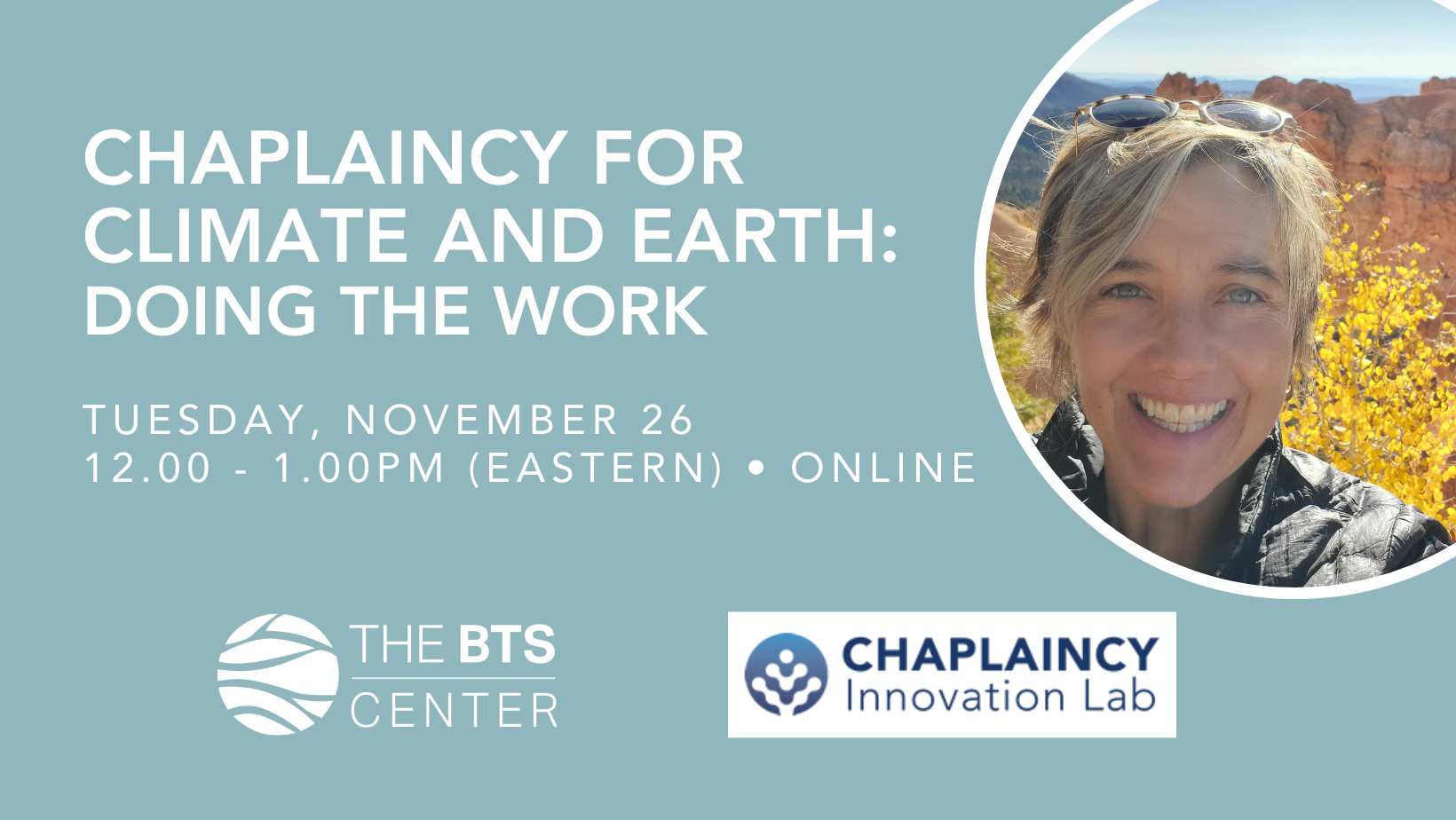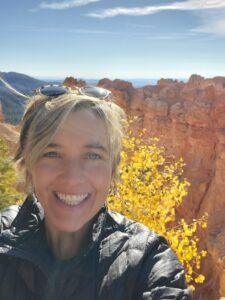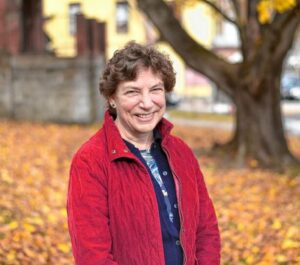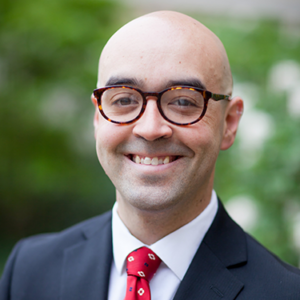
Chaplaincy for Climate and Earth:
Doing the Work
Occurred on November 26, 2024
“To be a chaplain who is tending ‘home’ can mean and look like a lot of things... It’s about understanding that I am as much a participant in the ecosystem, like the mushroom, like the bird, like the creek bed…” — Lauren Van Ham in Sojourners
Chaplains who ground their work in the healing power of being in relationship with Earth — particularly a climate-changed Earth — are shaping a new field of practice: climate conscious chaplaincy.
As the real effects of the climate crisis are felt across all nations and peoples, there is such great need for responsive, skilled, compassionate spiritual care to address the short-term and long-term needs of those who are, and will be, affected by these new realities. The conditions to which we must adapt, and the changed landscapes of which we must make sense, require adjusted spiritual understandings for each of us, as well as the support that will enable us to make those adjustments.
But what exactly is “The Work”? Our presenter, Lauren Van Ham, has asked and answered this question for herself in roles as varied as our society itself: working with multi-national corporations and non-profit organizations; teaching, coaching and mentoring; and creating ceremonies, prayers, and writings.
Lauren joined us for this special conversation about the work of chaplaincy rooted in relationship with Earth in these times of crisis and change.
View the conversation below, recorded on November 26, 2024
Meet Our Presenter
 Lauren Van Ham is an ordained interfaith minister. She served as a hospital chaplain for nine years, focusing in psychiatry, palliative care, and bereavement support, and later served with a consulting firm where she custom-designed employee engagement programs for multi-national companies committed to sustainability and culture change. Her passion for spirituality, art, and Earth’s teachings infuse her focus in eco-ministry and sacred activism.
Lauren Van Ham is an ordained interfaith minister. She served as a hospital chaplain for nine years, focusing in psychiatry, palliative care, and bereavement support, and later served with a consulting firm where she custom-designed employee engagement programs for multi-national companies committed to sustainability and culture change. Her passion for spirituality, art, and Earth’s teachings infuse her focus in eco-ministry and sacred activism.
For more than a decade, Lauren was Dean at The Chaplaincy Institute, an interfaith seminary based in California, US. Her essay, “Way of the Eco-Chaplain,” appeared in the collection, Ways of the Spirit: Voices of Women; and her work with Green Sangha was featured in Renewal, a documentary celebrating the efforts of religious environmental activists from diverse faith traditions across America. She is a guest writer for “Progressing Spirit,” an online publication exploring theology, spirituality and public events.
Lauren is a spiritual director and guest faculty for several schools in California and serves as Earth Restoration Coordinator for the United Religions Initiative, a global interfaith grassroots organization. She holds degrees from Carnegie Mellon University and Naropa University.
Meet Our Hosts
 The Rev. Alison Cornish serves as the Coordinator of the Chaplaincy Initiative at the BTS Center. Alison spent the first half of her professional life working as an historic preservationist and architectural historian, primarily in New England and on Long Island, NY. After 20 years of work with museums, municipalities and nonprofit organizations, Alison attended Andover Newton Theological Seminary in response to a felt sense of call directly from Earth to address what is it that we are doing in our daily lives and habits that is destroying the planet that we inhabit. Following CPE, field education in interfaith work and parish ministry, and ordination in the Unitarian Universalist tradition, Alison served congregations on Long Island while also embarking on studies with the Buddhist teacher Joanna Macy and Dominican sister Miriam McGillis. Alison became a GreenFaith Fellow in 2013, and a Climate Reality Project presenter in 2017. She has served as Senior Director of Programs at Partners for Sacred Places, Executive Director of Pennsylvania Interfaith Power & Light, Director of Seminary and Congregational Initiatives at Interfaith Philadelphia, and as the Affiliated Community Minister at First Unitarian Church, Philadelphia. Alison’s facilitation work includes the Work That Reconnects, training-the-trainers for Civil Conversations, group practice of Nonviolent Communication, and the curriculum “Healthy Congregations.” A Program Consultant for the BTS Center since 2021, her work has focused on ecological and climate grief, religious imagination, and chaplaincy in a climate-changed world. Alison and her husband Pat live in Shelburne Falls, Massachusetts, on the unceded lands of the Nipmuc and Pocumtuc peoples, in the watershed of the Connecticut River. When not working, Alison can be found along, on, and in, a local natural body of water, currently the Deerfield River.
The Rev. Alison Cornish serves as the Coordinator of the Chaplaincy Initiative at the BTS Center. Alison spent the first half of her professional life working as an historic preservationist and architectural historian, primarily in New England and on Long Island, NY. After 20 years of work with museums, municipalities and nonprofit organizations, Alison attended Andover Newton Theological Seminary in response to a felt sense of call directly from Earth to address what is it that we are doing in our daily lives and habits that is destroying the planet that we inhabit. Following CPE, field education in interfaith work and parish ministry, and ordination in the Unitarian Universalist tradition, Alison served congregations on Long Island while also embarking on studies with the Buddhist teacher Joanna Macy and Dominican sister Miriam McGillis. Alison became a GreenFaith Fellow in 2013, and a Climate Reality Project presenter in 2017. She has served as Senior Director of Programs at Partners for Sacred Places, Executive Director of Pennsylvania Interfaith Power & Light, Director of Seminary and Congregational Initiatives at Interfaith Philadelphia, and as the Affiliated Community Minister at First Unitarian Church, Philadelphia. Alison’s facilitation work includes the Work That Reconnects, training-the-trainers for Civil Conversations, group practice of Nonviolent Communication, and the curriculum “Healthy Congregations.” A Program Consultant for the BTS Center since 2021, her work has focused on ecological and climate grief, religious imagination, and chaplaincy in a climate-changed world. Alison and her husband Pat live in Shelburne Falls, Massachusetts, on the unceded lands of the Nipmuc and Pocumtuc peoples, in the watershed of the Connecticut River. When not working, Alison can be found along, on, and in, a local natural body of water, currently the Deerfield River.
 Michael Skaggs, PhD is Director of Programs of the Chaplaincy Innovation Lab, overseeing the Lab’s education and networking initiatives as well as public relations. He is the host and producer of the Lab’s webinar series and editor of the Lab’s eBook series and newsletter.
Michael Skaggs, PhD is Director of Programs of the Chaplaincy Innovation Lab, overseeing the Lab’s education and networking initiatives as well as public relations. He is the host and producer of the Lab’s webinar series and editor of the Lab’s eBook series and newsletter.
Trained at the University of Notre Dame as a historian of American religion, Michael has a particular interest in interfaith dialogue and has served in innovative theological education programs. His work has appeared in Sociology of Religion, International Journal of Maritime History, American Catholic Studies, U.S. Catholic Historian, Books & Culture, and elsewhere. He previously served as Communications Director for Transforming Chaplaincy.
Meet The Chaplaincy Innovation Lab
 The Chaplaincy Innovation Lab (CIL), based at Brandeis University, launched in October 2018 to bring chaplains, theological educators, clinical educators and social scientists into conversation about the work of chaplaincy and spiritual care. As religious and spiritual life continues to change, the CIL sparks practical innovations that enable chaplains to nurture the spirits of those they serve and reduce human suffering.
The Chaplaincy Innovation Lab (CIL), based at Brandeis University, launched in October 2018 to bring chaplains, theological educators, clinical educators and social scientists into conversation about the work of chaplaincy and spiritual care. As religious and spiritual life continues to change, the CIL sparks practical innovations that enable chaplains to nurture the spirits of those they serve and reduce human suffering.
Meet The BTS Center
 With roots dating back to 1814, The BTS Center is a private operating foundation in Portland, Maine, building on the legacy of the former Bangor Theological Seminary. Today The BTS Center seeks to catalyze spiritual imagination, with enduring wisdom, for transformative faith leadership. Guided by the vision of human hearts renewed, justice established, and creation restored, The BTS Center offers programs of spiritual and vocational formation — workshops and retreats, learning cohorts, courses, public conversations, and projects of applied research — that aim to cultivate and nurture spiritual leadership for a climate-changed world.
With roots dating back to 1814, The BTS Center is a private operating foundation in Portland, Maine, building on the legacy of the former Bangor Theological Seminary. Today The BTS Center seeks to catalyze spiritual imagination, with enduring wisdom, for transformative faith leadership. Guided by the vision of human hearts renewed, justice established, and creation restored, The BTS Center offers programs of spiritual and vocational formation — workshops and retreats, learning cohorts, courses, public conversations, and projects of applied research — that aim to cultivate and nurture spiritual leadership for a climate-changed world.

